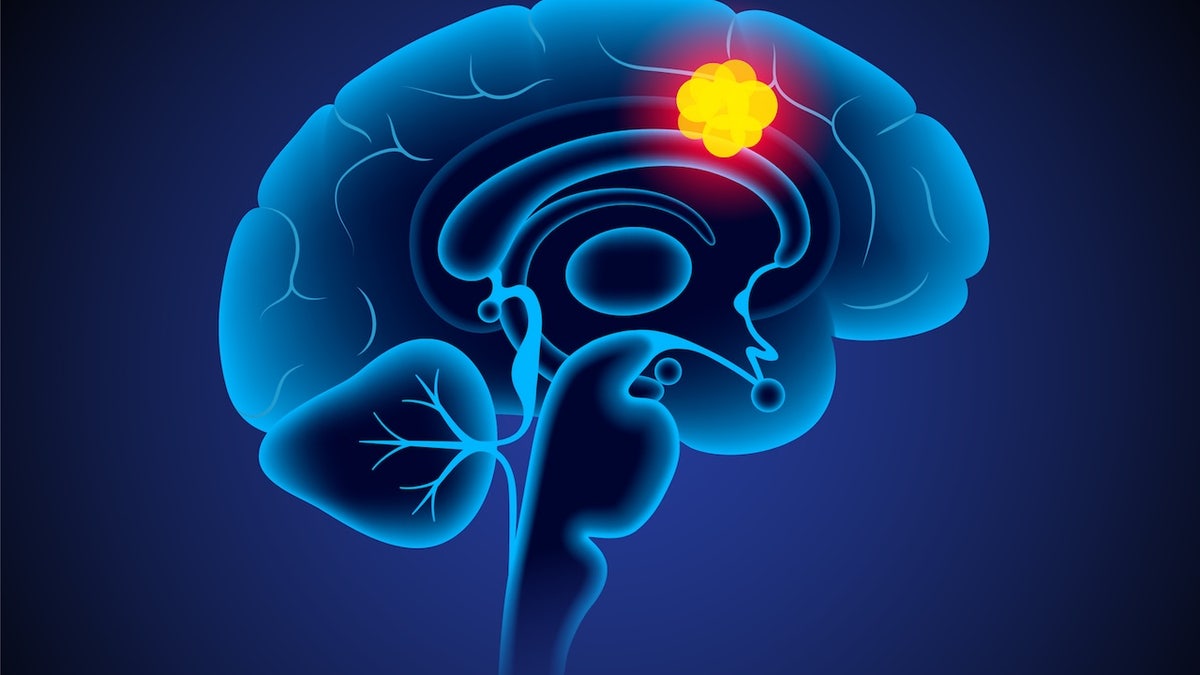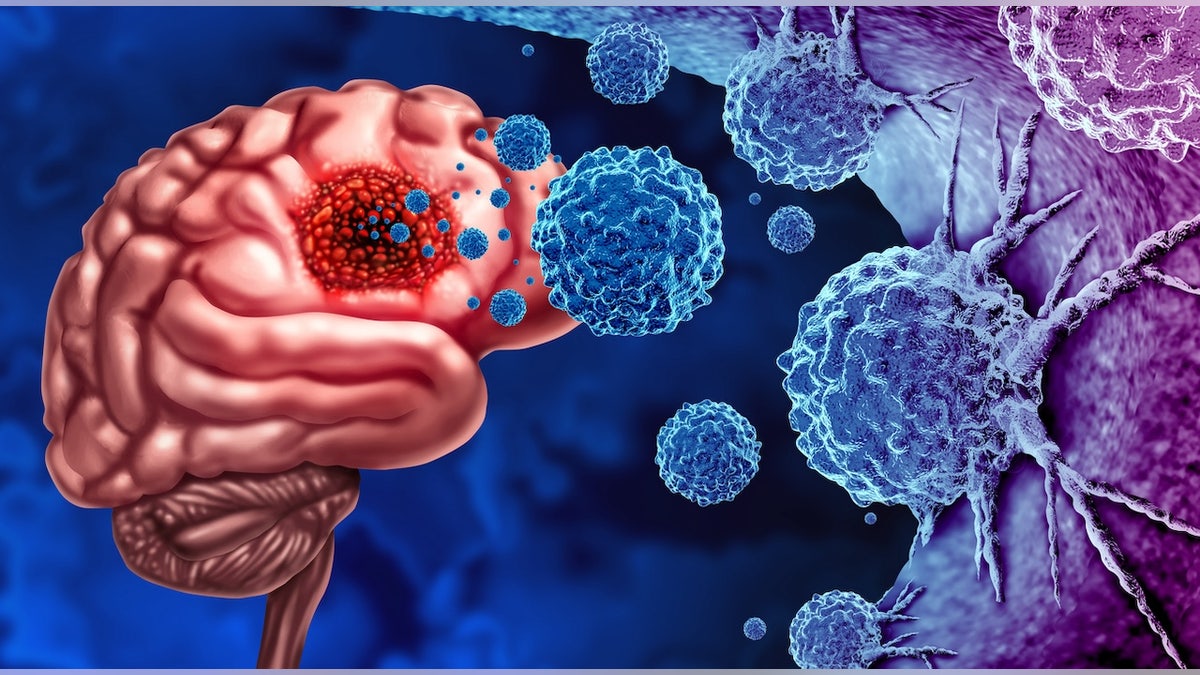Glioblastoma, the most aggressive and deadly type of brain cancer, is known to have a very poor prognosis — but a new study suggests that a pain-relieving drug could extend survival.
Researchers at Mass General Brigham have found that an already-approved medication — a pain reliever and anti-seizure medication called gabapentin — has been linked to improved survival in patients with glioblastoma.
The findings were published in Nature Communications last week.
MICHAEL BOLTON HAD STRANGE SYMPTOMS BEFORE BRAIN CANCER DIAGNOSIS: ‘SOMETHING’S WRONG’
Inspired by previous mouse studies that showed gadapentin’s potential in targeting tumors, the researchers studied the medical outcomes of nearly 700 patients with glioblastoma.
Many of them had already been taking gabapentin to alleviate nerve pain, according to a press release from MGB.

Glioblastoma, the most aggressive and deadly type of brain cancer, is known to have a very poor prognosis — but a new study suggests that a pain-relieving drug could extend survival. (iStock)
The patients who were taking the drug survived four months longer than those who were not — 16 months compared to 12 months — which was described as “statistically significant.”
“Ultimately, our goal was to highlight the emerging role of cancer neuroscience in GBM progression and emphasize the importance of exploring creative strategies to therapeutically target this evolving neural-tumor axis,” lead author Joshua Bernstock, MD, PhD, a clinical fellow in the Department of Neurosurgery at Brigham and Women’s Hospital, told Fox News Digital.
BREAST CANCER DRUG COULD HELP PROLONG SURVIVAL FOR CHILDREN WITH BRAIN TUMORS, STUDY FINDS
The team was surprised by the survival benefit, Bernstock noted.
“It’s always incredible to see a hypothesis come to life,” he said. “I was also really pleased to see the decrease in serum TSP-1 levels in the UCSF cohort, potentially positioning it as a biomarker of response.”

A pain reliever and anti-seizure medication called gabapentin has been linked to improved survival in patients with glioblastoma. (iStock)
Based on the initial findings, Bernstock reached out to researchers at the University of California, San Francisco (UCSF) to study more glioblastoma patients.
Among the 379 patients at USCF, the same outcome was observed — the ones who were taking gabapentin lived 20.8 months on average, compared to 14.7 months for those not taking the drug.
“There have been very few advances in survival for GBM patients since the early 2000s.”
“Across both cohorts (1,072 patients total), gabapentin use was consistently associated with a statistically significant improvement in survival,” Bernstock told Fox News Digital.
The researchers also noticed that the gadapentin group had lower levels of a protein called TSP-1, which is found in the blood serum, a finding that “needs further investigation.”

Glioblastoma claims the lives of around 14,500 Americans each year. The five-year survival rate is just 6.9%. (iStock)
“There have been very few advances in survival for GBM patients since the early 2000s,” Bernstock said in the release. “We need to think more creatively about the emerging biology in these tumors and how to target them.”
What to know about gadapentin
The U.S. Food and Drug Administration (FDA) initially approved gadapentin in December 1993 to treat seizure activity in adults; the approval was extended to include children in 2000.
Two years later, the agency approved gadapentin for nerve pain following shingles, according to the agency.
The drug is often prescribed for off-label use to treat a range of pain conditions, studies show.

The drug is often prescribed for off-label use to treat a range of pain conditions, studies show. (iStock)
Some of the more common side effects of gadapentin include fatigue, headache, dizziness, fever, nausea and vomiting, memory loss, trouble speaking, weight gain, vision problems, movement problems and recurring infections, according to Cleveland Clinic.
Certain medications may interact with gadapentin. Patients should speak with a doctor if they experience severe or persistent side effects, experts recommend.
Potential limitations and next steps
The study did have some limitations, chiefly that it is retrospective and was not controlled.
“While the findings are promising, the study is retrospective — patients were not given gabapentin in a controlled, randomized manner to directly assess its effects,” Bernstock told Fox News Digital.
“As such, larger prospective clinical trials are needed to validate these results and to further investigate the role of gabapentin and TSP-1 in GBM progression.”
CLICK HERE TO SIGN UP FOR OUR HEALTH NEWSLETTER
Bernstock said he is “cautiously optimistic” by the findings.
“While gabapentin is FDA-approved and generally well-tolerated, it’s not appropriate to change clinical practice based on these findings alone without a controlled study, something our collaborators at UCSF are working on,” he said.
“It’s not appropriate to change clinical practice based on these findings alone without a controlled study.”
“That said, in GBM patients who develop neuropathic pain or seizures post-craniotomy, there may be a rationale to consider gabapentin more readily than other agents.”
For more Health articles, visit www.foxnews.com/health
Glioblastoma — described by Bernstock as “a relentlessly progressive and nearly universally fatal disease” — is the most common type of primary brain cancer, according to Mayo Clinic.
The disease claims the lives of around 14,500 Americans each year. The five-year survival rate is just 6.9%.








